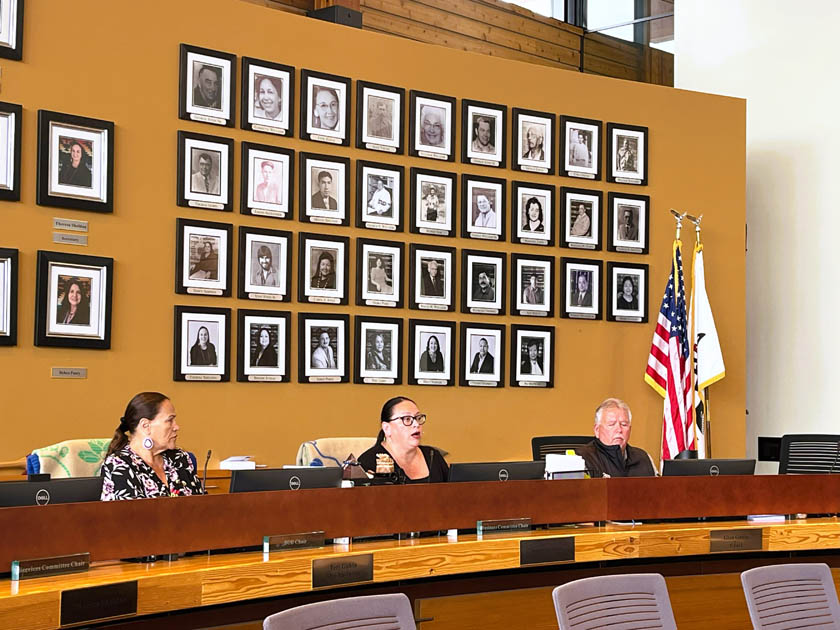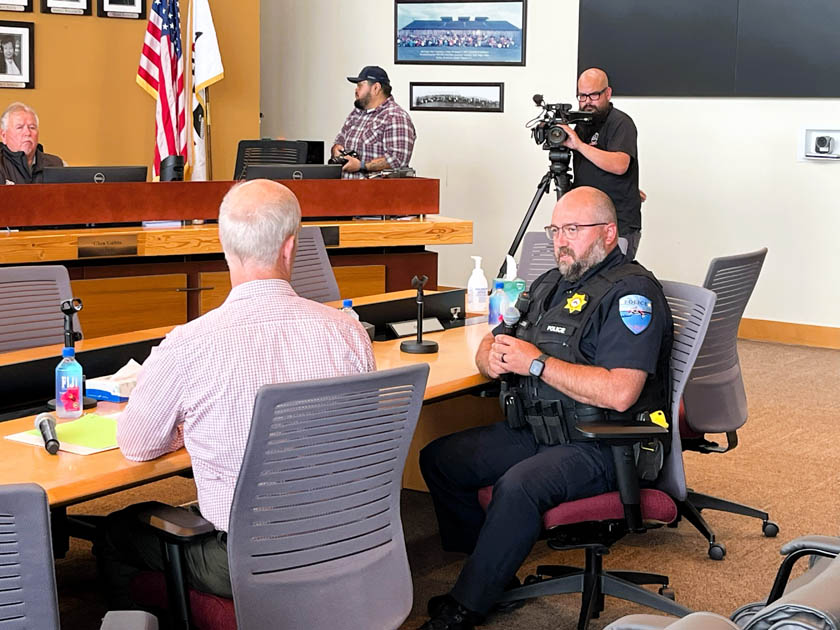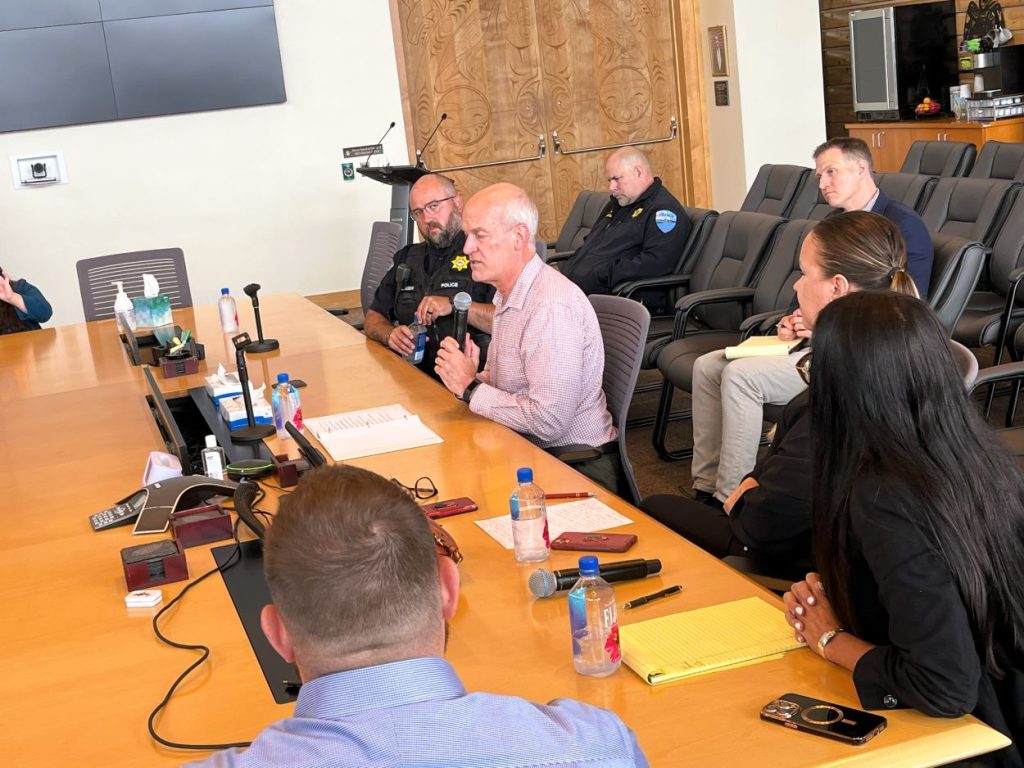TULALIP—The Tulalip Tribes’ headquarters resounded with thanks on Tuesday, August 6, directed toward Representative Rick Larsen (WA-02) for introducing in the US House of Representatives the PROTECT Act—Protection for Reservation Occupants against Trafficking and Evasive Communications Today—which, if passed, will give Tribal courts and law enforcement the ability to prosecute drug-related crimes for the first time in nearly half a century.

Since the landmark 1978 Supreme Court ruling, Oliphant v. Suquamish Indian Tribe, tribal courts have been unable to prosecute non-American Indians for most crimes including drug trafficking. In a time when opioid-related deaths are at an all-time-high, this has rendered many tribes helpless to combat the wave of organized crime that has taken advantage of, what Tulalip Tribal leaders consider, a broken law “very much steeped in racism.”
“The cartel, the people that bring the drugs in, they’re not dumb – they understand jurisdictional issues and they fully capitalize on it,” said Tulalip Tribes Vice Chair Misty Napeahi. “I hope this [the PROTECT ACT] gets passed, I hope you stand strong on this. You’re going to be standing up against racism while you’re on the floor. You will feel that institutional racism, but I hope that you guys stand strong and do what’s right for every single citizen across this nation.”
Napeahi challenged Representative Larsen at their meeting on Tuesday to speak with anyone living in Tulalip lands and try to find a single individual who has never had someone close to them, or known someone from a distance, die from fentanyl.
According to the Tulalip Tribes, more than 63 members have died from fentanyl overdoses since 2017.
In 2023 alone, the Lummi Nation had seven fentanyl overdose-related deaths, with five of those occurring in just a two-month span from September to October.
Lummi Nation Chairman Tony Hillaire testified to the Senate Committee on Indian Affairs in November 2023 that more than 70 Tribal members currently live in squalor with no sanitation facilities at a homeless camp in Bellingham. Therefore, some tribes have declared fentanyl and the opioid crisis a public health emergency.
“The saddest part about it is the children,” said Tulalip Tribes Chair Teri Gobin Tuesday. “So many children are being left orphans from both of the parents passing away from overdose and we’re having a lot of children being born with [fentanyl] in their system.”

Last year the Tulalip Tribes held the National Opioid Summit which addressed the intersection of COVID-19 and the opioid crisis throughout tribal communities. Representative Larsen was a guest at that event and heard the challenges many tribal leaders face. From those conversations, and with other stakeholders in the area, Larsen formulated his report on the opioid epidemic which he released in January earlier this year.
The four pillars of Larsen’s proposed solution were prevention, intervention, treatment, and recovery. It was out of the intervention portion of this solution plan that gave birth to the PROTECT Act, which is co-sponsored by Republican colleague Ryan Zinke (MT-01), on Tuesday, August 6. Representatives Tom Cole (OK-04), Derek Kilmer (WA-06), Marie Gluesenkamp Perez (WA-03) and Adam Smith (WA-09) also joined as original cosponsors of the legislation.
Supporters of the bill include Tulalip Tribes, Affiliated Tribes of Northwest Indians, Lummi Nation, Swinomish Indian Tribal Community, Confederated Tribes of the Colville Reservation, Confederated Tribes of the Chehalis Reservation
If passed, the PROTECT Act would provide parity for Tribal courts to issue search warrants for certain electronic communications, including social media, by adding Tribal courts to the list of courts with “competent jurisdiction” under the Stored Communications Act.
The PROTECT Act would also expands Special Tribal Criminal Jurisdiction (STCJ) to crimes associated with drug trafficking, and amends the Bureau of Prison’s (BOP) Tribal Prisoner Program (TPP) by expanding eligibility to offenders who commit drug-trafficking-related offenses.

“With this bill going forward it will give us the tools to prosecute criminals, which we always should have had but in a time that blatant racism was rampant they said we didn’t have jurisdiction,” said Tulalip Tribes Interim Chief of Police Chris Gobin. “This will help all of Washington State. These drugs just don’t stay on the reservation they go out to all of the surrounding areas. A lot of drug dealers like to come here because they think they have that safety. With this, it will help us have that tool to help curb it.”
Chief Gobin noted that Tulalip Police Officers are forced to rely upon other law enforcement agencies when dealing with suspected criminals but oftentimes they don’t respond. According to the most recent WASPC annual crime data report Washington State ranks last in the nation for commissioned Police Officers per capita.
In the five counties that Rep. Larsen represents, opioid-related deaths have more than doubled since 2019. According to the Centers for Disease Control and Prevention (CDC) tribal communities around the nation had the highest rate of drug deaths in both 2021 and 2022.
Larsen said Tuesday that the PROTECT Act is only one step towards combatting the opioid epidemic while calling upon the Biden-Harris administration to do more for its tribal communities.

“I raise my hand to all of you for the important work that you’re doing to save lives and make your communities safer,” said Rep. Larsen. “I look forward to working with you all to get the PROTECT Act passed and signed into law to ensure the tribes have the tools to combat the opioid epidemic and save lives.”
Just last month, Larsen introduced the Workforce Opportunities for Communities in Recovery Act with Rep. Pramila Jayapal (WA-07) and Sen. Edward Markey (D-MA) to create employment opportunities for people in recovery and support communities impacted by widespread opioid use.
Larsen also plans to introduce two additional opioid-related bills to provide funding opportunities for multi-jurisdictional drug task forces and to support harm reduction initiatives.
“Across the nation there is a fentanyl epidemic that every state is dealing with,” said Tulalip Tribes Councilman Glen Gobin.” For tribes it’s even more difficult because of the jurisdictional questions that come up; who has criminal authority over non-Indians on reservations?”
Since 2020, more than 650 people in Snohomish County have died of opioid-related overdoses. In 2022, more than seventy-five percent of Washington’s overall drug overdose deaths were linked to opioids. Even though the United States saw a three percent decline in overdose deaths overall during this period, deaths in Washington state increased by more than 21 percent.
Author: Kienan Briscoe










